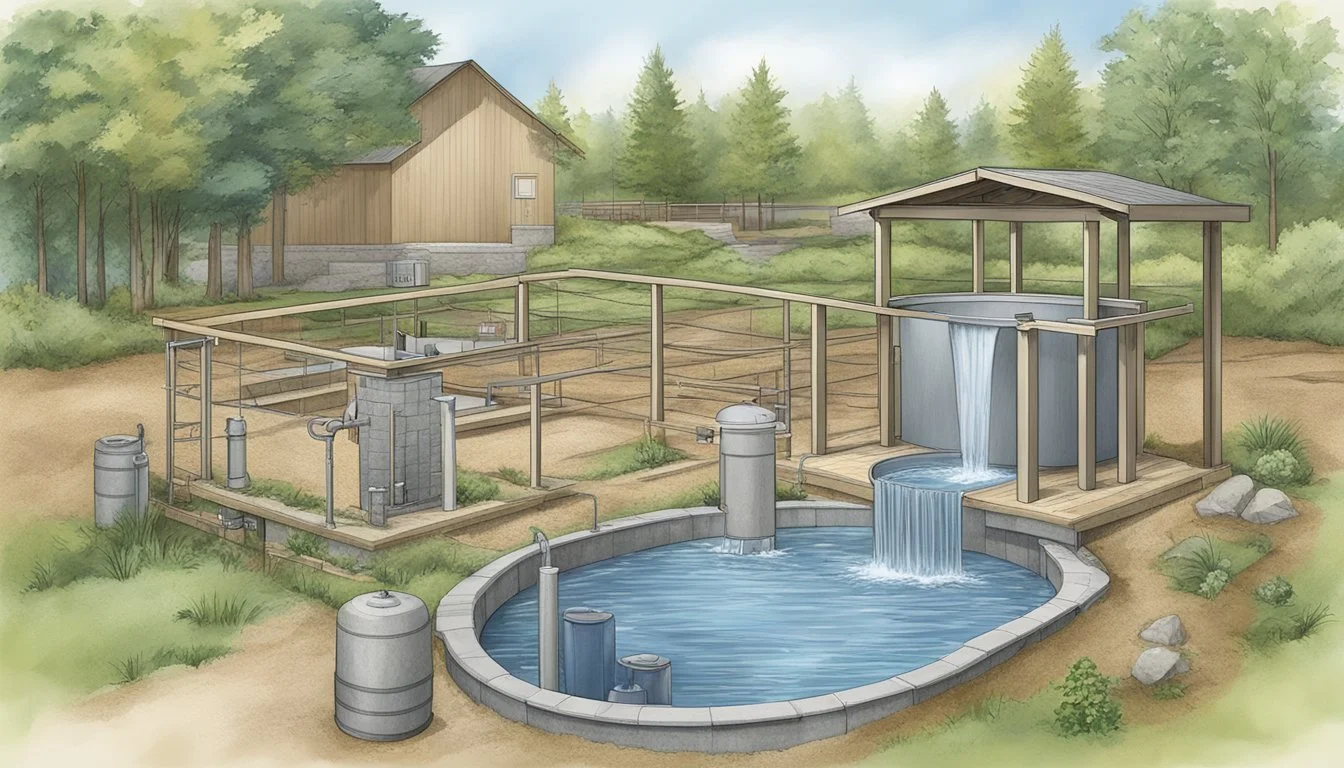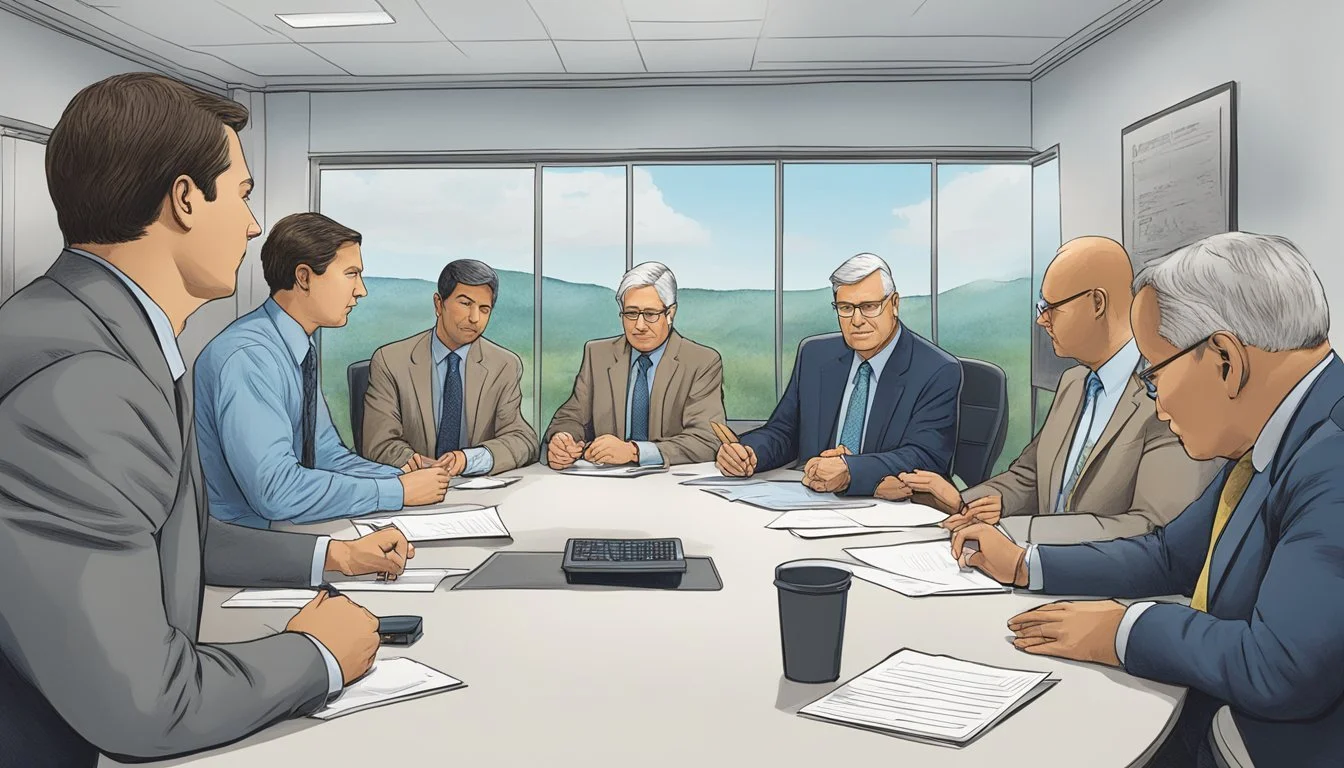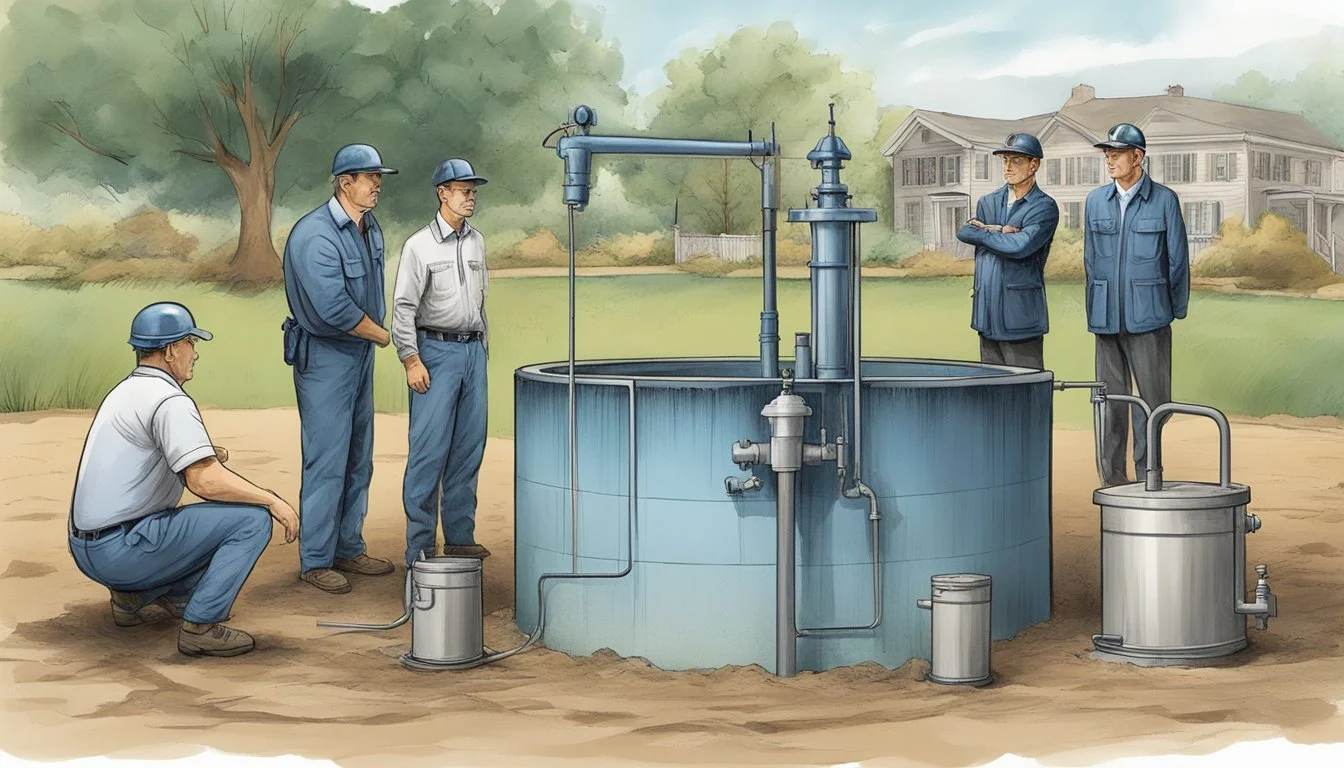Washington Water Well Regulations
Understanding Compliance for Property Owners
Water wells are an essential component of Washington State's water supply system, providing vital resources for both residential and agricultural needs. Given the importance of these water sources, the state has established a comprehensive framework of laws and regulations to ensure that wells are constructed, maintained, and decommissioned in ways that protect public health and the environment. Specialists in the field, such as the State well construction and licensing coordinator, are designated to oversee these regulatory measures.
Knowledge of the Washington State Department of Ecology's regulations is crucial for those involved in the construction and maintenance of water wells. The regulations outline the procedures for obtaining water rights, ensuring groundwater quality, and more. Additionally, adherence to Chapter 173-160 WAC standards is mandatory for planning and constructing water wells within the state, highlighting the specifics of site selection and well access requirements.
The state also emphasizes the need for public awareness and involvement in the drinking water regulation and compliance process. This ensures that the citizens of Washington have access to safe drinking water and are informed about the measures in place to maintain the quality of their water resources. Understanding these regulatory frameworks is indispensable for responsible water well management and the sustainability of Washington's water supply.
Washington State Water Well Regulations Overview
In Washington State, the construction, operation, and maintenance of water wells is governed by specific regulations and standards to ensure public safety and water resources management. These laws are set forth to protect both the quality of drinking water and the state's water rights.
Under the regulatory guidance of the Washington State Department of Ecology, well construction requires adherence to minimum standards designed to shield groundwater from contamination. It is mandated that all drilling companies must be properly licensed, and their well projects are to be regularly inspected.
Key components of the regulations include:
Licensing: Drillers must obtain the necessary licensing, demonstrating proficiency and compliance with state standards.
Inspection: Inspected wells ensure the proper fulfillment of regulations and safety measures.
Enforcement: The state administers enforcement to maintain standards, penalizing non-compliant practices.
Regulation Amendments: The regulations are evaluated and updated through the collaboration with the Well Construction Technical Advisory Group.
Washington's laws are outlined in Chapter 173-160 WAC, which details the applicable standards for different types of water wells and the process to apply for variances. Additionally, well owners are entrusted with certain responsibilities, such as ensuring that construction complies with the stated minimum standards and undergoing periodic testing for contaminants like coliform bacteria and nitrate as recommended in the Important Information for Private Well Owners document.
These regulations reflect Washington State's ongoing efforts to manage its water resources attentively, safeguarding the health of its communities and the integrity of its natural ecosystems.
Well Construction Standards
In Washington State, the construction of water wells is regulated meticulously to ensure the safety of groundwater resources. The Chapter 173-160 WAC outlines the minimum standards that contractors must adhere to during well construction.
Minimum Standards
The standards specify requirements for various aspects of construction, including:
Site selection and preparation
Casing and sealing materials
Sanitary protection during and after construction
Specifically, casing and liner requirements are critical, designed to prevent the entrance of pollutants and to protect the integrity of the well. Every well must be cased with materials approved by the Washington State Department of Ecology.
Drilling Materials
To preserve groundwater quality, only approved drilling materials can be used. The substances aid in drilling execution and maintain borehole stability, but must not contaminate the water supply.
Well Sealing
Upon a well’s conclusion of use, proper well sealing is mandated to eliminate pathways for contaminant entry. This process includes filling and sealing with approved materials, as outlined in the regulations.
Contractors must ensure that all materials and construction techniques conform to the construction standards to comply with state law. These regulations exist to safeguard the public's access to clean drinking water and maintain the state’s water resources’ integrity.
Groundwater and Resource Protection
Washington State places a significant emphasis on the protection and sustainable management of its groundwater resources. The regulations concerning water wells aim to safeguard both the quantity and quality of groundwater, which is crucial for environmental health, as well as public and agricultural use.
Groundwater Management
In Washington, groundwater management involves regulating the construction and maintenance of wells through specific codes. The Chapter 173-160 WAC outlines the standards for water wells, dictating how they should responsibly access groundwater. Certain areas may be restricted or closed to new withdrawals to preserve groundwater levels, underscoring the careful balance between usage and resource renewal.
One key aspect of well construction is formation sealing, ensuring that the spaces between the well casing and the borehole are sealed. Proper sealing prevents surface contaminants from entering the aquifer, a process detailed in Chapter 173-160 WAC: Minimum Standards for Construction and Maintenance of Wells.
Resource Protection Wells
The construction and use of resource protection wells are governed by regulations that prohibit the use of these wells for the withdrawal or injection of water for various purposes, including domestic and agricultural. These wells, as clarified in the WAC 173-160-420, cannot interconnect aquifers or be used for resource exploitation to prevent contamination and overutilization of the groundwater.
Moreover, surface seals are instrumental in resource protection, preventing the intermingling of different water-bearing formations. A regulation emphasis is on maintaining the natural pH levels of groundwater by preventing surface contaminants from altering it. The integrity of resource protection wells and geotechnical soil borings are critical to sustaining Washington's groundwater quality and availability.
Licensing and Training
In Washington State, the Department of Ecology oversees the strict regulations for water well drillers, emphasising the importance of proper licensing, continued education, and adherence to compliance measures for maintaining water resource integrity.
Driller Licensing
The state mandates that water well drillers secure a proper license before they can operate. The licensing process involves passing a comprehensive examination that assesses a driller's knowledge of the regulatory framework, technical skills, and safe drilling practices. Licensed drillers are required by the Washington State Department of Ecology to follow specific construction standards to ensure the protection of water resources.
Training and Education
Training and education are critical to the licensure of well drillers. Prospective licensees must undergo detailed training, including courses on the latest drilling techniques and environmental protection measures. The Water Well Operator's License includes a component of continual learning, where operators are expected to keep up-to-date with industry standards and environmental regulations through continuing education.
Renewal and Compliance
To maintain a high standard of practice, Washington State requires well operators to renew their licenses periodically. This process ensures that well drillers stay informed about the latest industry practices and regulations. Failure to comply with laws or renewal procedures can result in the suspension of a license or the issuance of conditional licenses that require drillers to meet certain conditions before full privileges are restored. Compliance with these regulations is monitored by the Department of Ecology and is integral to the sustainable management of the state's water resources.
Well Operation and Maintenance
In Washington State, the operation and maintenance of water wells are governed by stringent regulations to ensure the safety and sustainability of groundwater resources. Well owners are obligated to follow the best practices for pump installation and maintenance, as well as chemical conditioning and treatment, to prevent contamination and prolong the lifespan of their wells.
Pump Installation and Maintenance
Proper pump installation is critical for the efficient operation of water wells. The Washington State Department of Ecology specifies that all installation procedures must meet certain standards to maintain water quality and system reliability. After installation, regular maintenance is key. This includes routine inspections to check for wear and tear on the pump and its components, verifying the seal integrity to prevent contaminants from entering the well, and ensuring the electrical systems are functioning without exposure to water or moisture, to mitigate the risk of failure or hazardous incidents.
Chemical Conditioning and Treatment
Chemical conditioning and treatment are sometimes necessary to remedy water quality issues such as mineral buildup, bacteria contamination, or other forms of pollutants. The state mandates that only approved chemicals can be used for treating well water, and they must be handled in accordance with the Washington Administrative Code (WAC). Homeowners are responsible for maintaining records of any chemical use as part of their well management. Regular testing of water quality before and after treatment is essential to monitor the effectiveness and safety of any chemical applications.
Maintaining compliance with Chapter 173-160 WAC ensures that well systems in Washington are constructed, decommissioned, and maintained following the state's water resource protection objectives.
Legislation and Enforcement
Washington State rigorously enforces its water well regulations to ensure the responsible use and management of groundwater resources. The state's robust legal framework sets clear parameters for the construction, maintenance, and decommissioning of wells, paired with a comprehensive enforcement strategy.
Enforcement Actions
Washington's Department of Ecology is the principal agency that administers enforcement for noncompliance with water well regulations. They perform evaluations and can change rules through the Well Construction Technical Advisory Group. When necessary, the agency issues cease and desist orders to immediately halt unauthorized water use or non-compliant well activities.
Legal Proceedings
In instances where infractions escalate, the Department of Ecology may review cases and move them forward for legal proceedings. This step is taken to ensure that all stakeholders adhere to the established regulations. Water users may appeal enforcement actions if they believe they've been wrongly accused or that the actions are unwarranted.
Penalties and Remedies
Penalties for non-compliance can be severe and include both civil and criminal penalties. Washington State sets these consequences to deter illegal water use and ensure long-term compliance. The Washington State Department of Health outlines a step-by-step enforcement process which may result in fines or other remedies aimed at correcting violations. Reports of infractions and follow-ups on corrective measures are a crucial part of ensuring that compliance is not just a one-time event but a continuous responsibility.
Well Decommissioning and Sealing
Decommissioning a well in Washington State is a process governed by precise regulations to protect the aquifer and local environment. Owners must work with licensed drillers to follow the requirements for decommissioning and sealing abandoned wells.
Decommissioning Process:
Identify whether the well is no longer in use or no longer fit for use.
Notify the Department of Ecology, if required, before the decommissioning activities commence.
Hire a licensed well driller to ensure proper and safe procedures are adhered to.
Criteria for Decommissioning:
Safety: All debris, sediments, and obstructions must be removed.
Protection: Steps must be taken to prevent potential aquifer contamination.
Well Sealing:
Site-specific conditions determine the best methods and materials for sealing. Crucial factors considered include:
Casing material: Whether steel or plastic, the casing must meet established standards.
Soil cover: A predetermined amount of soil cover is required over the sealing material.
Key Steps in the Decommissioning Process:
Excavation: Remove accumulated materials within the well.
Sealing material: Use approved substances to fill and seal the well appropriately.
Confirmation: Once sealed, a report must be filed with the relevant Washington State authority.
It is vital for property owners to realize their responsibility in properly sealing unused wells. Proper procedures safeguard against environmental hazards and protect communal water resources. Detailed information on the decommissioning standards can be found in the Chapter 173-160 WAC and Washington State Department of Ecology.
Administrative Procedures
In the context of Washington State's water well regulations, adherence to administrative procedures ensures compliance with state requirements. These procedures outline financial obligations, mandatory disclosures, and mechanisms for recourse.
Fee Structures
The Washington State Department of Ecology stipulates clear fee structures for activities related to wells, including construction, reconstruction, and decommissioning. Fees vary depending on the type and depth of the well, and are mandatory for the processing of permits and documentation.
Reporting Requirements
Well owners and contractors are obligated to submit detailed water well reports to the Department after the completion of construction, alteration, or decommissioning of wells. These reports help in maintaining an accurate record of the water resources and well statuses in the state.
Appeals Process
In cases of disputes or dissatisfaction with decisions made by the regulatory authority, stakeholders have an appeals process at their disposal. This process provides a structured format to contest regulatory decisions or actions related to water well construction and management.
Public Resources
Washington State offers a variety of public resources for individuals seeking information on water well regulations. The Washington State Department of Ecology serves as a foundational reference, providing detailed insights into the laws and technical guidelines concerning well construction, maintenance, and licensing.
Key Points of Contact:
Statewide Well Construction and Licensing Coordinator: Scott Malone (Email: scott.malone@ecy.wa.gov)
Well Administrator: Althea Untalan (Email: althea.untalan@ecy.wa.gov)
Regulatory Guidelines: The Chapter 173-160 WAC lays out the requirements for well owners, including well planning, construction, reconstruction, and decommissioning of water wells. It also details requirements regarding water well reporting and metering.
For homeowners, the Homeowner’s Guide to Well Construction is an invaluable tool, providing all necessary information to ensure compliance with state construction standards.
For regulatory compliance regarding drinking water, the Washington State Department of Health effectively communicates the relevant requirements, and offers tools and information for preparing Consumer Confidence Reports (CCRs).
General Inquiries & Assistance: For broader concerns around water resources, the Department of Ecology’s Water Resources Program oversees the implementation of applicable laws, rules, and policies. The program provides support and guidance across various regions within the state, ensuring public access to reliable and current regulatory information.
Frequently Asked Questions
The following FAQs provide concise answers to common questions regarding the regulations for water wells in Washington State, ensuring private and shared well owners are informed of their responsibilities.
What are the current regulations for constructing and maintaining a water well in Washington State?
In Washington State, well owners must adhere to Minimum Standards for Construction and Maintenance of Wells, which outlines specific requirements for well construction to protect water resources and public health.
Are there any recent updates to the water well regulations in Washington State?
The Department of Ecology's Water Resources Program provides updates on regulations. It is advisable for well owners to review these resources routinely for any changes in regulation.
What are the legal requirements for establishing a shared water well in Washington State?
Establishing a shared water well in Washington State involves understanding water rights and ensuring proper agreement amongst all parties involved. Detailed guidelines can be found in the Department of Ecology's publications on water rights and shared water resources.
How does one obtain the water well logs for a specific location in Washington?
Water well logs can be obtained from the Washington State Department of Ecology, which maintains records of wells drilled, providing valuable information on depth, construction, and location.
What distance is required between a new well and existing structures or property boundaries in Washington State?
Regulations stipulate minimum distance requirements to prevent contamination and ensure safety. These distances are outlined in the Washington Administrative Code 173-160, which specifies the parameters for location and construction.
Is it legal for a homeowner to drill their own water well in Washington State, and what are the guidelines for doing so?
Homeowners are allowed to drill their own wells in Washington State, but they must follow specific guidelines and may require a permit. Water well construction regulations set by the Department of Health outline the process and the standards that must be observed.










